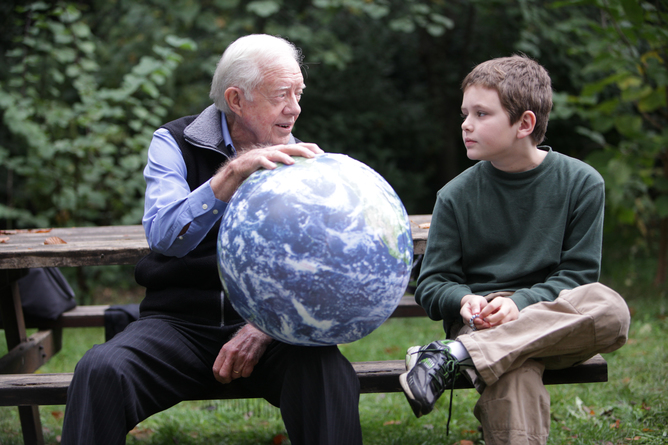
Similar to the fight to eradicate polio, there always seems to be some pockets of opposition to the flat Earth theory. But the “flat Earthers” have always existed; they just tend to operate outside the public’s radar most of the time.
The rapper B.o.B has since popularized the theory through his tweets and the publication of his song Flatline, in which he not only asserts that the Earth is flat but also incorporates a variety of other bizarre and fantastical concepts.
These include the ideas that the sun circles around the Earth, the Illuminati controls the new world order, certain celebrities are clones, the planet is ruled by lizard people, and Freemasons manage our lives. For one song, not terrible.
What would lead to such a profusion of illusions, even putting aside the fact that these theories are contradictory (are we ruled by lizards, the Freemansons, or the Illuminati?). The solution is simple in that it makes sense psychologically, but problematic in that it might be hard to correct.
Creating Our Own Stories
Above everything else, we are narrative animals. Without creating tales, we could not function in our daily lives. Without your help, I would be unable to combine words like “cage” and “bird” into a story or image. similar to (hand guitar) or (river, bridge). Our brains actively strive to match words even when they appear to be unrelated, such as (pensioner, wardrobe), and you’re still doing so as you read this.
The narratives that describe us as a people, a race, or a species are frequently intricate and nuanced. They discuss a wide range of topics, such as creation, nature, community, and progress.
There are two reasons we write stories. The first is to offer explanatory power, to explain the world around us in terms of causality, and to aid in navigating the terrain of our existence. To give us meaning and purpose is the second justification.
Through tales, we not only comprehend our world but also our position within it. The stories might be based on religion, culture, or science, but they all serve the same function.

Scientific Narratives
Our tales in science are created over time and draw from previous research. For instance, the story of evolution has astounding explanatory power. Without it, the world is just an array of shapes and colors. Each creature has a purpose and a function because of it.
According to the renowned article of the American-Ukrainian biologist and evolutionist Theodosius Dobzhansky:
We have gained knowledge of our place in the grand scheme of things and the lengthy and complex history of our planet through evolution. This understanding gives many of us purpose and a greater understanding of the reality of our life.
Similar to this, the origin of our solar system is a rich and captivating narrative that explains why the Earth is, in fact, more or less spherical.
Why then would anyone reject this?
One factor might be the requirement to reject an existing narrative in order to embrace mainstream scientific discoveries. This is true for fundamentalist readings of the Bible when it comes to evolution.
Accepting evolution means distancing oneself from the literalists’ worldview. Maintaining the consistency and integrity of their story is more important than analyzing the available scientific data. A symptom of this endeavor at ideological cleansing is the young Earth creationists’ urgent and fruitless hunt for evidence to refute evolution.
We may reject scientific narratives because we believe we have no place in them or are not a part of the group that generated them.
It can be challenging to consider oneself as important in a world when there is so much knowledge and we each have so little of it, as I have previously stated in relation to conspiracy theories.
Furthermore, science is difficult, as it turns out. So it could require some effort on our part if we want to own this story.
Absence of Rationality
It is so tempting to discover a method of seeing the universe that simultaneously rejects the need to understand science and returns us to a position of social advantage.
Rejecting science and adopting a different perspective, such as the idea that the Earth is flat, elevates the person from obscurity to a position of power among people who are knowledgeable about the “truth.”
BoB describes himself as “free thinking” in his lyrics. We may detect a hint of the justification he provides himself for rejecting science and labeling it a “cult” in this wording.
Instead, he makes a case for the flattening of the Earth using common sense. A popular tactic for claiming to be rational while rejecting the scientific community’s collective rationality is to use common sense (and a typical argument in climate denial).
Regaining a sense of control and independence is another goal. Research has shown a connection between believing in conspiracies and feeling like you have no control over your life.
We can aspire to be more meaningful and discover a cause to which we can contribute our skills if we can climb above the current of conventional wisdom and find a position from which we can hold a divergent and divisive viewpoint.
Coming Back From The Edge
How then could we interact with someone who has such ideas in an effort to persuade them to change? Although it’s not a simple undertaking, two things are crucial.
The first is to be prepared with the information—you need something to refer to—as well as the methods of verifying it. That could work in some cases if the story is weak or tense.
The second step is to comprehend the story that individual has created, its depth and style, as well as the factors that have contributed to its development, as facts are sometimes insufficient in this regard. Only after that can the otherwise insurmountable barrier to collective knowledge be overcome.
Why then bother? Why not let preachers preach, rappers rhyme, and naysayers nay? It could appear that we are just working with a small portion of the outer limits of the literal or logical universe. However, it goes without saying that inactivity in the face of issues like immunization and climate change might have negative effects.
In either case, we ought to at least defend the knowledge that has been fought for over many generations and by the personal sacrifices of those who have committed their lives to its pursuit.
Because if all points of view are equal, then all points of view are useless, and none of us should accept that.

Leave a Reply